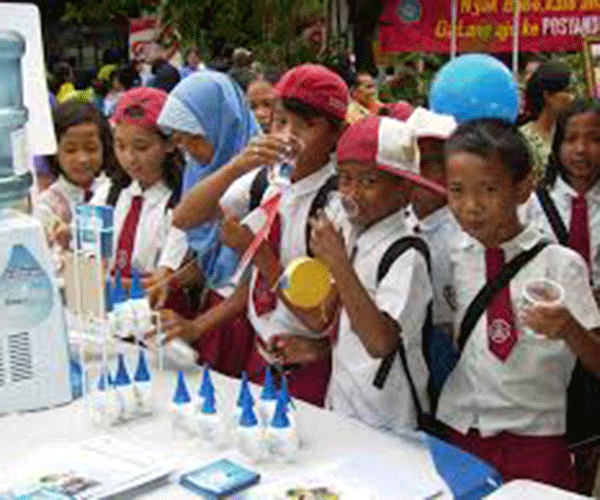Tonight the Director General for of Disease Control and Environmental Health (P2PL) launched the National Network for Household Water Treatment and Safe Storage, and oversaw the transfer of the Aman Tirta program to the MOH and the private sector. The network is the culmination of five years of work between the USAID funded Aman Tirta program, the Ministry of Health, and a network of private and public organizations.
Boiling water for ensuring safe drinking water has been the most recognized norm for Indonesian households, and has been one of the only options available to Indonesians. While a good practice, fuel is expensive and studies have shown that there are high levels of contamination post boiling.
Aman Tirta, a USAID funded program, was launched in 2005 with the objective to provide sustainable access to an affordable water treatment method by producing and distributing a chlorine-based solution that was developed by the U.S. Centers for Disease Control. The product was Air RahMat and it was developed in collaboration with the private sector company, PT Tanshia Consumer products. Johns Hopkins Bloomberg School of Public Health’s Center of Communication Programs and CARE International Indonesia collaborated to make this the first water treatment program that used a commercial scheme to distribute a non-subsidized water treatment product.
The Aman Tirta partnership used a variety of approaches to change practices around safe water. Through the media, Air RahMat was promoted as a safe and economical alternative to boiling and bottled water. At the community level, a mobilization program worked with communities, schools, Posyandu, Puskesmas, and local leaders to educate about the need for and benefits of safe water and the different water treatment technologies available. Large sampling programs gave a chance for people to try Air RahMat treated water, and ask questions.
The Aman Tirta program in partnership with the Ministry of Health established Household Water Treatment and Safe Storage as a key pillar in the MOH’s strategy for improving hygiene. The experience of Aman Tirta in promoting Air RahMat was an entry point for other water treatment methods to be accepted as a norm for ensuring safe drinking water. Due to this partnership and the work of all the partners, The Ministry of Health has developed and issued a policy for the General Guidance for HWTS, initiated HWTS roll-out in 10 districts and created a national a network of institutions that work on HWTS promotion. The private sector companies are partners in this program and ensuring that their water treatment technologies are being supplied.
After a day of sessions, the PAMRT Network was launched presided over by the Director General of Disease Control and Environmental Health (P2PL) with a ceremony to bid farewell to the Aman Tirta program and a transfer of the program to the HWTS partners. The Aman Tirta program ended this year and they shared a set of lessons learned from the past five years that were delivered through the words of their partners. The HWTS program is now being carried out by the Ministry of Health. District Health Offices, and the private and public sector members of the network.





